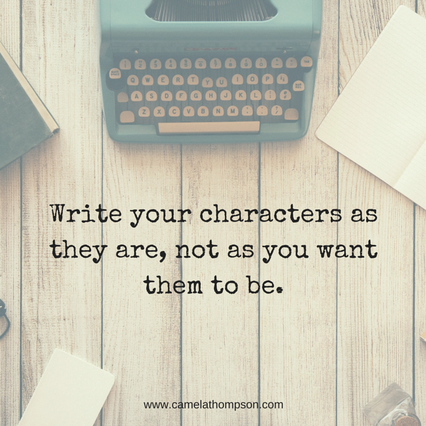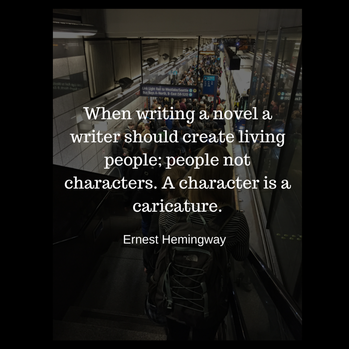|
by Camela Thompson "Writer's block is a bitch." I found that little gem while reviewing older versions of a published manuscript. The line sat neatly tucked underneath complaints about my characters. I expressed my concern that Olivia didn't display enough strength. A character who had the canniness to avoid a stalker for ten long years still wasn't ready to turn on him and do him harm. Lucian presented a larger problem. One moment he offered to help a perfect stranger, and the next he displayed a level of selfishness that made him completely unlikable. The concerns punctuated by my obvious predicament of writer's block reminded me of some solid advice I've passed along to others. It's something I have to relearn from time to time. Write your characters as they are, not as you want them to be. My process for writing a novel usually begins with a compelling concept, or even a single line that sticks in my mind. Then the plot comes together. The lengthy part is getting to know my characters. They don't jump out at me during the first few pages. I get impressions of their quirks and some broad strokes of their overall demeanor, but that isn't enough. A story isn't convincing without a strong understanding of the characters. I've broken the factors that drive rewrites and writer's block into three main points. How Do You Motivate a Character to Show Up? Consider a character with severe social anxiety. I need her to go to a party to meet another character who is motivated to help her find a serial kidnapper. A serial kidnapper who (unbeknownst to my main character) is targeting her. What would make her agree to attend a party? It's not likely that her extrovert best friend would be able to simply talk her into attending. If my character is told it's a small get-together and she has a favorite activity that will be the focus of said get-together, she may consider going. If her friend had given up something meaningful in order for her to attend, this may also motivate her. A guilt trip or expressed concern may help push her over the edge. The social anxiety would likely require all of these combined to allow her to make herself uncomfortable. If I can find something that helps reduce her anxiety, I may have a shot at keeping her at the party long enough to interact with someone without having to resort to removing her ride home. How Do Characters Form Bonds? Let's go another layer deeper. What would compel two opposites to bond? My main character's best friend is an extrovert. If they shared something in common, perhaps a secret or a fundamental difference from the people around them, they may have enough in common to bond. Perhaps our extrovert knew what it was like to be different and stuck up for her new friend? Considering my difficulty in getting my main character to a social function, it's unlikely they met at a party. My main character is in college, and it's not impossible to imagine that she hit it off with a new roommate or a classmate. But with an introvert who has the added burden of social anxiety, it may make more sense to have my main character attend a large school if she were able to attend with a best friend. While it's possible my characters met more recently, she would be more likely to tolerate a difficult environment with someone she loves. It would also make my main character more likely to subject herself to discomfort if it were someone she cared for deeply. How Do You Motivate a Character to Act Out of Character? An introvert woman with a kind soul must kill someone. There are several circumstances that could push someone to kill, but the most compelling in this instance is protecting someone my main character loves. Self-defense could also push her to defend herself, but I've seen people who refuse to stand up for themselves put everything on the line for someone who is incapable of defending themselves. Perhaps they wished someone would have done the same for them, but the more likely reason is they know how it feels. And no one should have to feel like a victim. Creating motivating factors that are both internal and external are crucial, but how do you figure out who your character is to being with? I've heard a lot of great advice:
Finally, keep in mind that readers are willing to suspend belief to a point. The reason why it's so important to keep in mind what I've outlined above is because you don't want to lose your readers. If you haven't provided compelling reasons for your characters to act as you need them to, or if you put them in a scenario that doesn't make sense, the reader may walk away from your story. Compelling characters have flaws and quirks, but they also do everything for a reason--whether we agree with them or not.
Who is your favorite character and why do you like them? What kind of motivations made them who they were?
1 Comment
4/27/2016 07:39:22 am
You and I have opposite dilemmas: I'll find myself sitting down to write the outline of a possible story, and instead of writing a plot, I find I'm writing character profiles!
Reply
Leave a Reply. |
Camela ThompsonFreelance writer and Dark urban fantasy author featuring vampires with bite. My BooksCategories
All
Archives
July 2020
|


 RSS Feed
RSS Feed